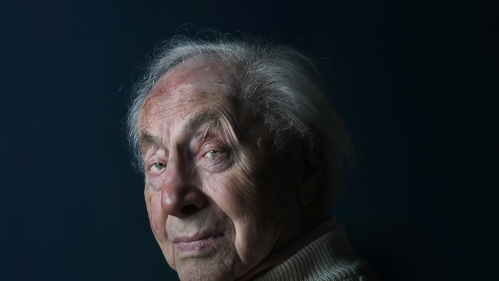He was on his way to England via Africa, a young man born in 1920 to Russian Jewish immigrants in New York City. As a newly minted Air Force navigator, his mission was to deliver a B-24 bomber and its 10-man crew to an airbase in Britain. It was nighttime in the Sahara. As he looked at the moon, he remembered how “terribly romantic and freezing cold” the night was.
Soon, Eugene Polinsky would begin a series of clandestine flights aboard B-24 Liberators that might well appear romantic to an outside observer but were, in fact, exceedingly dangerous and, yes, quite often frigid. Polinsky ED’41 spoke about the danger to National Geographic in 2020: “If we let it bother us,” he said, “it would destroy us.” Instead, those flights became the defining experience of a long, rich, and well-lived life.
Polinsky had initially imagined that his life would be “defined by theater.” As a kid, he had appeared in school plays and knew immediately he had a knack for acting. “I could throw myself completely into a role,” he recalls, “and it wasn’t acting for me: I was being a different person, in a different place.” After high school, he planned to go directly into theater until reality—in the form of his father—intervened. “Papa thought I should be going to college instead of show business,” he says. So he enrolled in the newly founded Bergen Junior College in Teaneck, New Jersey—where, he remembers, “I could at least smell New York”—with a plan to launch his acting career after completing the two-year program.
Instead—again at his father’s rather forceful urging—he found himself at Rutgers, where he majored in education and continued to study theater. It was an experience he would cherish. “I liked widening my horizons, I liked making new friends, I liked almost the entire college experience,” he says. What he didn’t like were what he calls “the social divisions.” As a Jew, he discovered he could join only a Jewish fraternity, an idea that rankled him. Antisemitism, he notes, didn’t exist solely at Rutgers: “There were divisions galore back in those days.”
After his graduation, 80 years ago this spring, Polinsky would indeed go on to a life in show business as an actor, a director, and a writer. Lee Strasberg, the celebrated founder of The Actors Studio, became his mentor and close friend. He worked with Charlton Heston and Orson Welles. But the greatest role for a man who celebrated his 100th birthday in September 2020 was as a navigator flying missions for the Office of Strategic Services, the wartime intelligence agency.
His unit was known as the Carpetbaggers. Their assignment was to airdrop agents, weapons, money, and materials into occupied Belgium, Norway, and France, supporting resistance fighters working to thwart the Nazis in Europe. The Carpetbaggers flew single sorties by night, with no protection, in stripped-down planes painted black, sometimes descending as low as 300 feet over their targets. The work was hazardous; many of the aircraft, and the men who flew them, never returned from their assignments. But to be aiding the resistance, especially as a Jew, was, for Polinsky, “thrilling. I felt that I was doing more than being an individual soldier,” he says. “I was a partisan. I was fighting Hitler.” Interestingly, he says, most of the sought-after navigators in the Carpetbaggers were Jewish. “I figure,” Polinsky explains, “we had something worth saving.”
The Carpetbaggers’ missions were so clandestine that the men who flew them were ordered not to talk about them for 50 years after the war’s end. The most critical of those missions was in 1944 when the unit was charged with flying underwater mines to the Belgian Underground, which would use them to clear the Port of Antwerp of Nazi ships. Three crews were downed trying to deliver those mines. Polinsky’s team was sent out to make the fourth and final effort. They succeeded, and though they had no idea at the time–they didn’t even know the nature of their cargo—their efforts would be vital in ending the war in Europe by keeping Allied supply lines flowing.
The nature of their mission became apparent in 2001 after Polinsky received a strange invitation to a reception in Belgium for a book about the liberation of the Port of Antwerp. He arrived at the reception and was surprised to encounter a room full of eminent men and women milling around as if they were waiting for something or someone. “I thought,” says Polinsky, “‘What are they waiting for?’ Well, they were waiting for me—I was the only one left from my crew.”
He was stunned and humbled. At the ceremony, he was awarded the Belgian Croix de Guerre for bravery in combat—“my rarest medal,” he says—and met, for the first time, some of the resistance members he’d supported during the war. He’s returned to visit them each year since then to celebrate the liberation and revel in the bond they’ve formed. “It’s extraordinary,” he says. “They’re my second family.”



